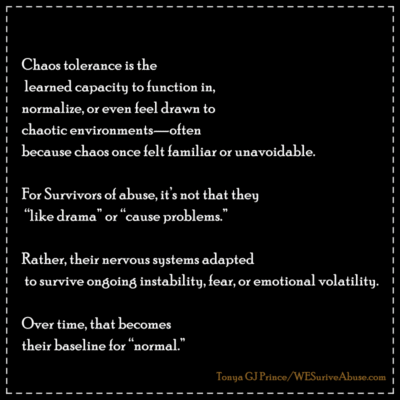Some of us grew up learning to breathe in the middle of storms. We learned to sleep through shouting, to laugh through danger, to keep functioning th
Some of us grew up learning to breathe in the middle of storms.
We learned to sleep through shouting, to laugh through danger, to keep functioning through heartbreak.
We learned to manage everyone else’s moods just to keep a sliver of peace.
That’s what they call chaos tolerance—the skill of surviving instability so long that you forget stability was ever your birthright.
We became experts at it. We could sense tension before it spoke. We could fix, smooth, and quiet things before they broke. We could carry the weight of entire households, relationships, and communities on our backs—and still say, “I’m fine.”
But when we finally start to heal, peace feels foreign.
Boundaries feel selfish.
Calm feels suspicious.
Because we were conditioned to believe that chaos was proof of love, and boundaries were punishment.
🌿 Healing Means Lowering Your Chaos Tolerance
Lowering your chaos tolerance doesn’t mean you’ve grown fragile—it means you’ve grown wise.
It means saying:
“I no longer confuse exhaustion with purpose.”
“I will not let someone’s crisis become my identity.”
“I deserve a calm life, even if I have to build it from scratch.”
Peace is not the absence of love—it’s what love feels like when it’s safe.
Boundaries are not barriers—they’re the edges that protect peace once you finally have it.
You were never undeserving of either. You were simply trained to believe that calm was a privilege you had to earn.
Now you know it’s a human right.
✨ Affirmation
I am worthy of calm.
I am allowed to rest without apology.
My boundaries are sacred—they guard the peace I once thought I didn’t deserve.
I will not mistake chaos for connection again.
💭 Reflection
Ask yourself with tenderness:
When things are quiet, do I feel nervous, like I should be doing something to keep the peace?
Who taught me that saying “no” was unkind?
What does peace feel like in my body when I stop waiting for the next explosion?
There’s nothing wrong with you if boundaries feel like rebellion.
For many of us, they are.
But they’re also how we return home—to ourselves, to safety, and to the truth that peace isn’t something we earn. It’s something we reclaim.